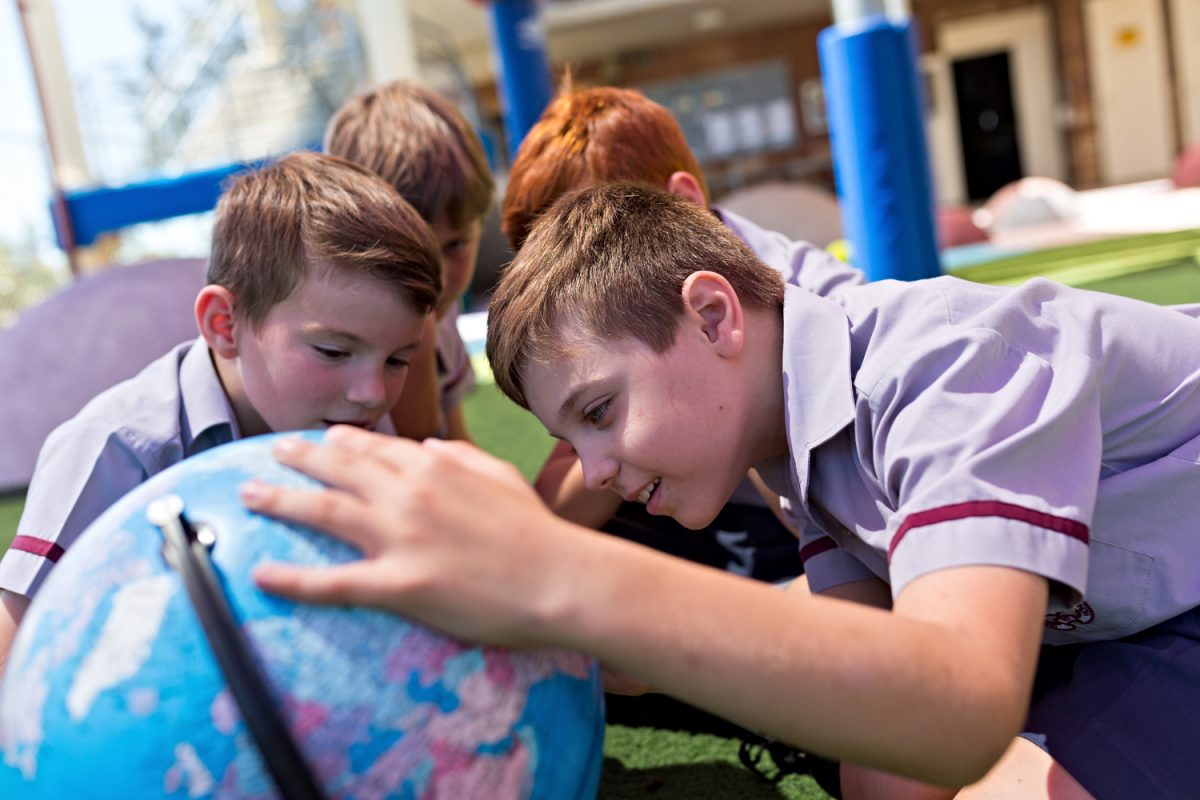Worldwide study rates best school techniques for boosting global mind-set in students
Posted: 25 November 2019

A worldwide study into how to grow young people’s capacity to respectfully connect and cooperate with people in other cultures, has identified volunteering and learning about different cultural perspectives as the most effective practices.
Recognising that students need new skills and attitudes to navigate an increasingly connected yet culturally divided world, last year the OECD’s Programme for International Student Assessment (PISA) unveiled a test of ‘global competence’, which it defined as being open to diversity, concerned for others elsewhere in the world, respectful of other cultures, and able to understand others’ perspectives.
Now Round Square has commissioned an extensive international study to find out how global competence can best be taught within schools, involving more than 11,162 students and 1,903 teachers in 34 countries across 6 continents (download from our website here)
Dr. Christina Hinton and team of researchers from Research Schools International and the Harvard Graduate School of Education, who conducted the study on behalf of Round Square, found that students’ global competence is best developed through volunteering, learning about different cultural perspectives, celebrating cultural diversity, discussing world events and learning how to solve conflicts.
These five approaches not only came out of the study as statistically significantly related to multiple PISA global competencies but were also were rated “effective” or “very effective” by the majority of teachers and students, who cited volunteering as the most effective overall, and backed their opinions with numerous practical examples.
Nine in ten teachers (90%) and three-quarters of students (76%) said volunteering their services in the wider community made them more ‘globally competent’. Researchers said initiatives such volunteering at soup kitchens, refugee centres and care centres encouraged students “to empathise with communities and understand their needs”. Volunteering promoted students’ interests in communities with different backgrounds and was most impactful when it took the form of a long-term partnership with successive visits.
One student from Hotchkiss School in Lakeville, Connecticut, said: “After being on a rebuilding site and helping with landscaping and a few interior projects, I realized that doing something as simple as this can make a great impact in someone’s life. Understanding our global world is not about who knows most or who can make the biggest impact, but simply educating yourself on one or more issues and lending a hand when you can. It’s all about compassion.”
Another student from the Brookhouse School in Nairobi, Kenya spoke about the way her experience in Nepal changed her view of what it means to be a compassionate global citizen: “Prior to the trip, my perception of service was donating money and goods to people in need, the sort of actions affiliated with a typical NGO. However, this project taught me to think of service as a partnership, essentially helping people to help themselves. For the first time I truly understood the value of extending a hand out as opposed to giving a hand-out.”
Learning about different cultural perspectives was also deemed by four-fifths of students (81%) and by a similar proportion of teachers (86%) as one of the best ways to nurture global competence. These involved such things as interactions with exchange students, connections with schools abroad, and pen pals, but also things like debates and school clubs that celebrated diversity.
The type of inter-school conference described by one student from Belgrano Day School in Buenos Aires, Argentina is typical: “Students are assigned a country and must defend, develop and discuss… problems from the point of view of that country.”
Or as another student from Latymer Upper School in London put it: “Learning about other countries and cultures make you realise how privileged we are to have what we have. It also allows you to realise how important your culture is to you and how important other people’s is to them. It also emphasises how your culture may make you biased to certain opinions and how to be more open and accepting.”
Participating in events that celebrated cultural diversity was also popular with teachers, with over four-fifths of them (83%) saying it was effective. Whilst students agreed, this was to a lesser degree, with 68% rating it as effective, the lowest scoring of the top five practices identified. Researchers found that events such as observing religious and cultural holidays, hosting debates on global issues or inviting in guest speakers from different backgrounds all contributed to greater cultural inquisitiveness among students and deeper self-awareness of their own values and views.
Students were more receptive to classroom discussions about world events, with three-quarters (75%) saying it would increase their global competence and over four-fifths of teachers agreeing (83%). Researchers said as well as giving students an opportunity to practice debate, these types of discussions also enabled students to appreciate their own biases, and that they could be especially helpful when the teacher was more of a facilitator than a protagonist.
Both teachers and students also rated solving conflict in the classroom in the top five, though they were marginally less sure about its effectiveness than some of the other leading approaches. Seven in ten students (71%) rated it as effective, as did four-fifths of teachers (82%). Activities such as class discussions on how to tackle global issues and engaging with non-profit organisations dedicated to solving international and domestic problems were cited by researchers as useful endeavours. And the study also noted the importance of incorporating leadership development in conflict resolution – because it helped students develop a sense of accountability and teamwork.
As one student from Gordonstoun School in Scotland pointed out: “Having opportunities to take leadership roles at school helped me understand that leadership isn’t necessarily about being the first, or necessarily the best, but being the one who can bring people together towards a shared goal and create a team spirit. I started to learn that leadership isn’t about making yourself the priority, it’s about representing your team members.”
One teacher from Providence Day School in Charlotte, North Carolina, said it was important that children learnt about others who weren’t necessarily like them: “The more students are exposed to other cultures, the more they will develop an understanding and appreciation for those that are different from themselves.”
Or as one German student put it: “For citizens in rural Bavarian places, however, it is not easy to accept foreigners with a completely different cultural background as their new [neighbours]. We tried hard to help refugees find living space and bring the different cultures together so that local citizens could overcome their prejudices. Both aspects are equally important if we want innocent refugees to have a future in our country and – considering how [privileged] we are – meet our human responsibilities.”
Round Square, which is committed to building character, global competence and life skills, hopes that schools anywhere will be able to use the findings of this study as a toolkit of good practice to draw on in their own contexts.
Rachael Westgarth, Round Square Chief Executive, highlighted the importance of schools taking part in research studies that further the wider education agenda: “As a community of schools that spans the globe Round Square has the opportunity to identify good practice approaches that can be adapted and implemented in any classroom. We really want to be able to share our collective experience with any school seeking to develop students’ international understanding and build respect for other cultures and perspectives. I think this commitment has been clearly demonstrated by the thousands of teachers and students who contributed their time, experiences and expertise to this project.”
Dr Christina Hinton, who led the research, added that: “Students will need global competence to engage in international collaborations in fields such as science, health, and technology, navigate an internationally interdependent economic and political landscape, and tackle global issues like climate change. This study is exciting because it is the first of its scope to identify which education practices effectively support PISA global competencies. Our research indicates that these practices can be adapted for use in a diversity of schools across various countries, which makes their potential for impact quite inspiring. By spearheading this work, Round Square can have ripples of impact in schools around the globe.”
